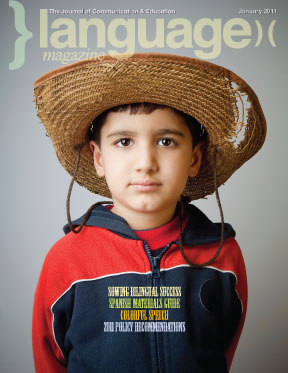Cautious Optimism
As we enter the New Year, we continue to be challenged economically which, in turn, aggravates social tensions. But there are signs to the optimists amongst us that suggest we are moving toward a more cooperative phase of development where education and educators are truly valued.
As the new Congress begins, we may have extremists calling for the revocation of automatic
citizenship for anyone born in the U.S. but, amongst the majority of moderate representatives, we also seem to have a growing, bipartisan consensus that simple, quick fixes are not going to close educational achievement gaps.
According to Secretary of Education Arne Duncan, “On many issues, Democrats and Republicans agree, starting with the fact that no one likes how NCLB (No Child Left Behind) labels schools as failures, even when they are making broad gains. Parents, teachers, and lawmakers want a system that measures not just an arbitrary level of proficiency, but student growth and school progress in ways that better reflect the impact of a school and its teachers on student learning.
“These issues are at the heart of the Obama administration’s blueprint for reauthorizing ESEA (Elementary & Secondary Education Act): more flexibility and fairness in our accountability system, a bigger investment in teachers and principals, and a sharper focus on schools and students most at risk” (The Washington Post, 1/3/2011).
Now, Duncan is still placing too much emphasis on testing and teacher evaluation but he is acknowledging that schools need flexibility and more investment — a step in the right direction.
Another positive indicator suggesting that the teaching profession may be regaining the prestige it once held is that last year, 12 percent of seniors at Ivy League colleges applied to Teach for America, which sends graduates to teach at schools in disadvantaged communities for two years. Although participation in the program may look good on a resume in a difficult job market, there must be some real long-term benefit in our top graduates gaining first-hand experience of teaching in challenging schools. Imagine how much easier it might be to secure school funding if most of the Fortune 500’s CEOs had spent a couple of years teaching in the trenches.
Elsewhere, CIA director Leon Panetta is demanding that we “get back to mandating language training as a requirement for graduating from college” (see News, page 10), and the Modern Language Association is reporting “significant increases” in the number of enrollments in world languages programs at U.S. colleges with nearly a million students now in Spanish programs (see News, page 9).
Despite the infighting, President Obama and the Republicans were remarkably productive in December. If our representatives can continue in this vein and be flexible in their approach, education reforms may succeed.
The recession has had a devastating effect on education budgets but the economic meltdown has also forced us to reassess priorities, and one of its positive consequences may be recognition of the value of teachers and a realignment of our educational goals to more closely resemble the needs of the 21st century global village that our children will inhabit.
IN THIS ISSUE:
How Can We Improve our Linguistic or Literacy Skills?
Every January, experts in our field share their opinions on how we should tackle an issue of importance in the New Year
Kathy Pon, Irma Bravo Lawrence and Arturo Duran describe how a charter school in California’s Central Valley has reaped the benefits of becoming completely dual-language
Language Magazine’s guide to the latest innovations for the Spanish classroom
Alan Kennedy explains how the perception of color in different languages reveals cultural diversity
Last Writes Richard Lederer on JFK’s stylish speech
Plus all the latest news in language learning technology, book reviews, and source information on language funding






